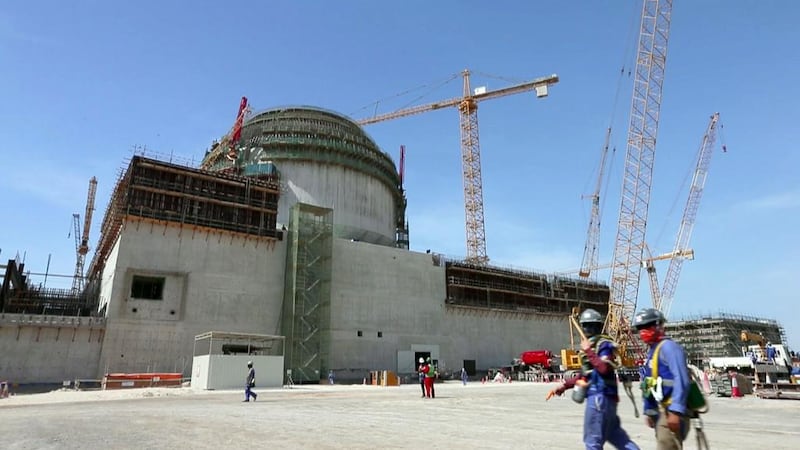VIENNA // The UAE is looking at different options, including building an underground facility, to manage and dispose of the radioactive waste from the nuclear power plants it will open in Barakah.
The country took part in the International Atomic Energy Agency’s scientific forum on radioactive waste management on Tuesday to learn from nations that are already advanced in the field, such as France, Sweden and Finland, to ensure it applies the best model for its nuclear programme.
“We are looking at various options available globally to deal with radioactive waste,” said Hamad Alkaabi, the UAE ambassador to the IAEA. “One option is the development of a geological repository, which means after you use the spent fuel, you store it for some time and eventually dispose of it in a repository underground. The second option is to send the fuel abroad for reprocessing and then send back the reduced volume to be disposed of in the country in a repository with a smaller radioactive amount.”
Since the establishment of the UAE’s nuclear power programme, the country has set a policy to develop a strategy for the management and disposal of nuclear waste.
“It’s part of the planning process and part of the responsible approach the UAE has taken,” Mr Alkaabi said. “Since then, it has adopted a few elements in relation to waste management, including regulation in the safe management of waste and engaging in many international activities in this area.
“From an industrial point of view, the power plant in the UAE already has some elements to deal with waste storage in a way that the spent fuel pool is planned to have almost double the volume compared to conventional sizes. This means you can store the spent fuel pool for 10 years instead of five.”
The country is closely following other players that have already started the process of building a repository.
“The UAE is engaged in different activities internationally in developing partnerships with countries that managed to advance in this area, such as France, Finland and Sweden,” he said. “The forum is a beneficial one because it allows countries like the UAE and other newcomers to learn from the existing experience and the steps forward for the industry.”
The building of a geological repository in the UAE is being evaluated with the help of international experts for the development of a national policy.
“We’re seeing now some of the first steps being taken internationally and the UAE is closely trying to understand,” Mr Alkaabi said. “We have joint workshops with France to understand their experience in developing the waste strategy but also the advancements in waste management.”
Yukiya Amano, IAEA director general, said it was important to revisit the issue of radioactive waste as the peaceful use of nuclear science and technology had grown steadily in the past decade, as has the amount of radioactive material.
“There is a widespread perception that solutions for managing it safely simply do not exist,” he said. “This isn’t correct. Well-established technologies do exist to address this issue. Radioactive waste is an issue for all countries, not just those which have nuclear power programmes, and all countries using nuclear technologies have a responsibility to manage it safely.”
He said much more complicated technologies were required to deal with high-level waste, also known as spent fuel.
“It is true that geological disposal of them has not yet been licenced anywhere in the world,” Mr Amano said. “But serious work has been done in several countries at the licencing stage.”
Djarot Wisnubroto, chairman of the National Nuclear Energy Agency of Indonesia, said scientists were still trying to create a more secure technology that could solve the problem of radioactive waste management.
France expects to have its geological repositories operational in the 2020s, according to Gerald Ouzounia, the international director at the French nuclear waste agency Andra.
“Whatever technology is chosen, a repository is essential,” said William Magwood, director general of the OECD Nuclear Energy Agency. “The deployment of a deep geological repository for high-level waste will reduce uncertainties and raise public confidence.”
cmalek@thenational.ae






